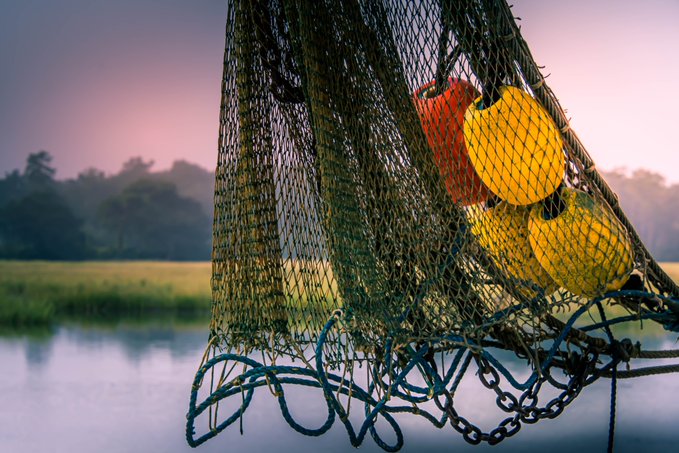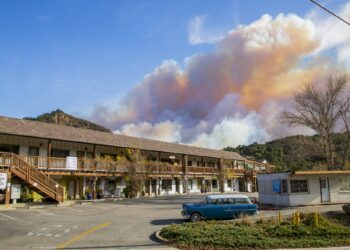Fishing communities around the world are seeing a decrease in yield from fish stocks, including in the United States where the Commerce Department recently approved disaster declarations for fisheries in seven states. While the declaration fails to list climate change among the factors putting intense stress on fish populations and the communities which rely on them, research suggests climate change plays a significant role, and conditions will only continue to worsen as the planet steadily heats up.
A study by Sustainable Fisheries Group Researcher Christopher M. Free et al. published in March found that because of climate change and poor management of fish stocks there has been an overall reduction in yield from fish stocks during the period from 1930 to 2010. Although the study found some fish populations benefited from warmer waters, most of them experienced a negative impact on growth. Researchers found a 4.1 percent decrease in yield overall, and some regions experienced decreases as high as 15 to 35 percent.
Climate change is a major factor in the health of fish populations, but University of British Columbia Professor Rashid Sumaila told The Globe Post other factors hurt fish populations as well, particularly overfishing.
“When it comes to the ocean, it’s not only climate,” Sumaila said. “We have overfishing, we have other pollutants like plastics and so on but these things are interrelated. One of the things that occupy my mind is looking at how if we were able to reduce overfishing, how could that make our fish stocks more resilient to climate change?”
UPDATE on 2019 NE Pacific Marine Heatwave: In early Oct, we observed heatwave split into 2 distinct features. Latest images show it reformed into single feature & moved farther offshore, w/warmer than avg temps off WA coast, Gulf of Alaska & Bering Sea. https://t.co/J4p0398Rps pic.twitter.com/7qtHn1SAKM
— NOAA Fisheries NWFSC (@NOAAFish_NWFSC) October 22, 2019
According to Olaf P. Jensen, who worked on Free’s study, impacts of both overfishing and climate have been particularly apparent in the Pacific Northwest.
“The productivity has been going down for several populations because of climate change and because of that, the management advice given by scientists to the managers has in many cases been wrong,” Jensen told The Globe Post. “Managers are dealing with scientific advice that is no longer as robust as it used to be. It’s hard to predict the future when you can’t rely on the past as a guide.”
Another study from the University of British Columbia, which Sumaila worked on examined the potential effects on fisheries if countries implement the goals of the Paris Climate Agreement compared to other warming scenarios in which countries don’t do so.
The study found 75 percent of maritime countries would benefit from implementing the agreement and doing so could save millions of metric tons of each year in annual global fish catch, billions of dollars in revenue for fishers, income for seafood workers, and household seafood expenditure.
In a recent example of how fishing communities are struggling to maintain fishing populations, the U.S. Commerce Department Secretary Wilbur Ross declared fishing Disasters in seven states including Louisiana, Mississippi, Alabama, California, Alaska, Georgia, and South Carolina. Notably, the Commerce Department’s press statement on the disaster declarations does not include any mention of climate change. The declaration makes these states eligible for fisheries disaster relief funds. For the fiscal year 2019, Congress appropriated $165 million for fishery disasters.
Research Associate at the University of British Columbia Andres Cisneros-Montemayor told The Globe Post fishing communities should have access to disaster relief funds but said unless humans reduce greenhouse gas emissions, fishing communities will become increasingly reliant on such funds.
“With this announcement, they’ve made it easier for communities to access relief funds when they have extreme weather events or other negative impacts from climate,” Cisneros-Montemayor said. “The important thing to not lose sight of is if we don’t do something to actually reduce our emissions and start to combat climate change itself, then we’re just going to be paying out more and more and more in emergency relief funds in the future.”
Jensen stressed that while it’s impossible to attribute any one specific climate event to climate change, unusual events like major hurricanes and storms that before would occur only once every 500 years are becoming more and more common. In the Gulf of Mexico, increased precipitation levels are causing salinity changes in the ocean which species like shrimp and oysters are particularly vulnerable to.
“Record rainfalls in the spring led to high levels of freshwater discharge into coastal areas in Louisiana and other Gulf States,” Jensen said. “Oysters and shrimp were hit pretty hard and shrimp are incredibly valuable down there. So the climate change angle is quite clear, but it’s less about temperature than about changing precipitation patterns.”
Cisneros-Montemayor said some ways fishing communities can adapt to changing conditions include better management of fisheries that would allow populations to be more resistant to climate change as well as fishing other species that haven’t previously been as heavily fished. Those kinds of things might work in the short term he said, but ultimately, the only thing that will really make a difference is reductions in emissions.























